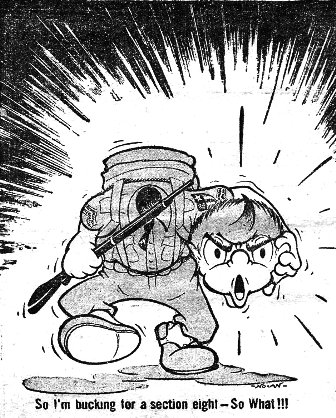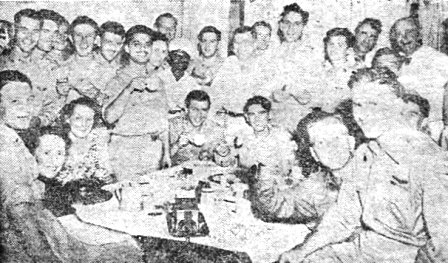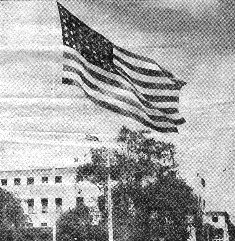
VOL. I NO. 37 REG NO. L5015 DELHI, THURSDAY MAY 27, 1943
10TH AIR FORCE STRIKES HARD
|
Communiques from Maj. Gen. Clayton L. Bissell's 10th Air Force HQ during the period of May 18-24 told a glowing story of success against the Jap in Burma. At the cost of one bomber, the 10th Air Force thrice pounded the enemy with more than 100 tons of bombs; destroyed five of his fighters and probably three more; and staged a night raid upon Rangoon, Prome and Taungup.
The thumbnail sketch:
MAY 18 - The Jap felt the heaviest-ever weight of bombs - over 100 tons. B-24's in strength dropped 87 tons. Two flights of heavy bombers attacked the supply center at Minbu and started three large fires. A third formation pin-pointed its raid upon railway installations at Prome, demolishing tracks and rolling stock. A fourth reported "all bombs in the target area" at Thayetmyo, smoke indicating a fuel dump hit ... Medium bombers struck at Lanywa and Chauk.
MAY 19 - Greatest weight of bombs was reported for the second day in a row, this time 125 tons. B-25's attacked the Lanywa workshops and installations at Singu. Four formations of B-24's spread destruction. Two deposited 50 tons of explosives on enemy installations at Magwe and started 11 fires. another attacked the Padukkan oil fields. The fourth pounded installations at Thayetmyo and Pyaye.
MAY 20 - For the third day in a row, the enemy was smacked by more than 100 tons of bombs. Mediums attacked factories, warehouses and the sawmill at Monywa and Myingyan, scoring direct hits. A steamer was damaged near Alon. Heavies struck at the cement plant at Thayetmyo. A second flight of B-24's attacked the enemy workshop at Yenangyaung, a third warehouse at Prome and a fourth destroyed the mill at Allanmyo.
MAY 21 - Medium bombers hit the workshop at Chauk, were intercepted by enemy fighters. In a running, one-half-hour battle, one of our bombers was lost, but we accounted for five Jap confirmed, three probables, and damages six of his planes.
MAY 22 - Two flight's of B-25's attacked the railway installations and warehouses at Kanbalu. Heavy bombers made a night raid upon Rangoon, Prome and Taungup.
MAY 24 - Despite bad weather, operations continued. A flight of mediums pounded the railroad yards at Thazi. Fighters and fighter-bombers attacked enemy barracks at Kamaing and Washawng.
MOST U.S. TROOPS IN PACIFIC ZONE, PRESIDENT SAYS
WASHINGTON (WD) - The large majority of U.S. forces overseas are in the Pacific war zone, said President Roosevelt at a press conference. he also stated that air force strength is equally divided between the Pacific and Atlantic. He added that the movement of supplies to China is going along "pretty well."
Roosevelt disclosed that U.S. shipbuilding is now far out-distancing ship losses and is surely drawing a ring of steel around the Axis. He paid tribute on the eve of Marine Day to men who build and sail the ships of our Merchant Marine, expanding our vital supply lines and keeping them on the highway to victory.
Asked whether he and Prime Minister Churchill had evolved any formula for Italy's future, Roosevelt answered, "Unconditional surrender."
CO-PILOT 'TALKS' AIRPLANE TO EXPERT CRASH LANDING
EAST INDIA BOMBER BASE - After Lt. Wilson Thomas had made a perfect "no-casualty" crash landing with no engines, crew members agreed that F/O T. J. Smith, co-pilot, certainly talks a good landing.
Starting as soon as the second engine of the B-25 quit without a sputter, Smith began talking Thomas in with expressions like, "It's easy, Thomas, like shooting fish in a barrel." Temporarily interrupted by Thomas's reminder "to can the pep talk and call the air speed," Smith resumed his cool chatter while performing his regular co-pilot duties, letting down flaps at Thomas's order just in time to balloon the ship over some very rough ground into an easy landing in a soft rice paddy.
Crew members, shedding parachutes, were out of the ship and surrounded by several hundred curious Indians in a few seconds.
Other members of the crew were: T/Sgt. Leon N. Weber, bombardier, S/Sgt. Irvin H. Lawrence, engineer gunner, S/Sgt. W. E. Shafer, radio gunner, Sgt. C. E. Strike, gunner, and Lt. Alex Porter, navigator.
THAT PESTIFEROUS TELEPHONE
|
WASHINGTON - Lt. Gen. Joseph W. Stilwell, who endured the horrors of the Allied retreat from Burma, complained after one day in Washington that the telephone "is the worst thing ever invented."
That was the good-natured comment from the commander of the United States forces in the China-Burma-India Theater when the telephone rang in his hotel room today and interrupted snapping of a picture of his first meeting with Mrs. Stilwell in 15 months. The phone has been ringing continuously, he explained, since he arrived yesterday.
Mrs. Stilwell, who arrived from Carmel, Calif., said she thought the general was thin, but insisted he had regained 20 of the 30 pounds he lost on the retreat from Burma at the end of which he said "we took a hell of a beating."
'B-40'S' WALLOPING JAP WITH 1000-POUNDERS
S/Sgt. Edward F. Muraski writes the Roundup a few more particulars about the P-40's employment against the Jap in Burma carrying the heavyweight punch of a 1000-pound bomb. The strategy, evolved by Col. John E. Barr, was first reported in the May 6 issue of the Theater newspaper.
Barr, relates Muraski, undertook the dangerous experiment alone. Satisfied with his deductions, he took off one day with the big bomb hanging uglily from his fighter plane. On his first mission, the colonel missed his target, causing only slight damage. But he was satisfied, for it proved to him that it was possible to carry safely the half-ton load and, with greater finesse, hit the target.
THIS WAS START
This, then, was the start, reports Muraski. "Ever since, the colonel and his team of volunteer pilots have been bombing airdromes, towns and bridges with tons of explosives."
Muraski tells how the colonel and his unit placed bombs accurately upon a bridge, but two of the bombs were "duds." When the Jap repaired the bridge, he didn't bother to remove the "duds." So when the "B-40's" paid a return visit with six 1,000-pound bombs, EIGHT bombs went off. It will be some time before supplies will again roll over this particular bridge.
Writes Muraski: "The young, energetic and athletic colonel personally leads all of the bombing raids."
CALLED 'DENTISTS'
He remarks that the pilots of his unit are called "dentists," earning the sobriquet because of the devastating bridge work they have been performing on Tojo's railroad bridges in northern Burma - shifting bridges completely off their supports, twisting bridges, removing bridges and replacing them by empty space.
"You should see the mess the colonel and his deadly crew make of their targets," he concludes. "This writer has seen some very convincing aerial shots of mangled bridges, torn-up landing fields and blasted towns."
Circuitous Trip To Phone Only Block Distant

ASF, CENTRAL INDIA - This correspondent believes it high time somebody spoke out for the much-maligned A.S.F. boys who do the dull, necessary drudgery behind the lines that keeps the front-line troops supplied, fed, clothed, etc.
We sympathize with the plight of Cpl. Charles Gorman. On a trip to a railway station, he had his truck stall on a lonely road, miles from nowhere, it seemed. At 3:30 o'clock in the morning, after lengthy efforts, he managed to contact an Indian who could speak English well enough to tell Charlie the whereabouts of a public telephone. After travelling through villages, with dogs at his heels part of the time, camels and donkeys braying in the night and sending chills up and down Charlie's spine, they finally reached the telephone. After putting a call through to headquarters, he stepped outside and was surprised to find the truck was parked about a block from where the telephone booth was located.
Ye old station hospital here observed a birthday party recently. Indian style, we are just now getting around to mentioning it. Anyhow, a good time was had by all in the new day room and the old-timers (here 10 months) gabbed a bit with the new replacements fresh from the U.S. Bernice Deason, newly-appointed first lieuetenant, Nurse Corps., proudly exhibited shiny new silver bars, and received congratulations from all.
Speaking of promotions, able 1st Lt. Kenneth Kimball was elevated to the rank of captain. Every now and then something slips up, and merit is rewarded. Congratulations, captain. You're not doing bad for a man who was a master sergeant on his arrival in this theater last May.
The gods finally smiled on some local G.I.'s too, last week, and the following promotions were handed out: Pfc. James W. Potter to sergeant, Pvt. William L. Flourney to tech fifth, Pvts. Newton Grant, Willard Goins, and Leonard Green to pee-fces.
G.I.'S GIVEN NOTHING BUT ARMY'S BEST
WASHINGTON (UP) - Battle-scarred boys from Tunisia and Burma are recuperating at the Forst Glen Annex of the Walter Reed Hospital, once one of the nation's swankiest girls' finishing schools. The Army medical department took over 136 wooded acres of the National Park Seminary in January because they thought convalescents could recuperate quicker in a non-hospital atmosphere. The average length of stay is about 20 days. Most patients return to service. Four hundred and fifty soldiers live in quaint houses which were once used as sorority houses. The grand parlor, three stories high, decorated with paintings and statuary, is now the recreation hall, where jam sessions are held.
JAP MOVE INDICATES CHUNGKING DRIVE
CHUNGKING - Imminence of a Japanese drive upon Chungking was reported by observers of Chinese HQ, who announced that a big Jap offensive to the west of the Yangtse River front is about to begin. Transports are moving troops and supplies up the river from Hangkow to Ichang.
U.S. fighters intercepted an enemy raid upon an advanced American base in Hunan province and destroyed seven Jap fighters and two bombers and probably destroyed 10 other planes.
Chinese bombers, escorted by fighters, carried out a heavy raid against the Japanese-held town of Chihkiang Chiska in Hupeh province.
MONSOON INN OPENS DOORS - BIG NIGHT FOR KHAKICLADS
 All Bulltown society recently converged upon their new service club, named Monsoon Inn. It was a gala opening.
The fun lasted until the wee small hours of the morning. We believe the pictures speak for themselves. But don't be
fooled by the "beer" in the middle panel (if you can wrench your eyes for a minute off the local cheesecake). It's
only tea, with a special head.
All Bulltown society recently converged upon their new service club, named Monsoon Inn. It was a gala opening.
The fun lasted until the wee small hours of the morning. We believe the pictures speak for themselves. But don't be
fooled by the "beer" in the middle panel (if you can wrench your eyes for a minute off the local cheesecake). It's
only tea, with a special head.
Indian Seamen Get N.Y. Club
NEW YORK - The United States-British Merchant Navy Club for Indian seamen has been opened here at 100 West 38th Street. There are 200 Indian seamen currently at New York who eat well-seasoned curry and rice, play native music on instruments brought from Bengal and Assam, pray in a curtained prayer room within sound of Sixth Avenue traffic and the click of billiard balls in a downstairs pool room. Sir Godfrey Haggard, British Consul General, addressing 35 Indians participating in the ceremony, pointed out that the 40,000 Indians in the British Merchant Marine constitute about one-fourth of its manpower and added, "It is no exaggeration to say we could not possibly fight this war if it were not for our seamen."
 After G.I.'s of an advance India bomber base presented two shows at a nearby town for the benefit of the
SPCA, they were invited to several gatherings. This one was at the home of Mrs. J. F. Miller, lower left, where
coffee and waffles and syrup were served. Later, Mrs. Miller had her bearer carry her best china to the station
to serve early morning tea to the soldier-actors awaiting the train back to post.
After G.I.'s of an advance India bomber base presented two shows at a nearby town for the benefit of the
SPCA, they were invited to several gatherings. This one was at the home of Mrs. J. F. Miller, lower left, where
coffee and waffles and syrup were served. Later, Mrs. Miller had her bearer carry her best china to the station
to serve early morning tea to the soldier-actors awaiting the train back to post.
|
EAST INDIA BOMBER BASE - Enlisted men of this station made a "repeat performance" when they recently converged upon a nearby town and presented a two-night show for the benefit of th Society of Prevention of Cruelty to Animals. Several months previous, they staged a similar program for the benefit of the Red Cross, under the supervision of 1st Lt. Gerald Webb, special service officer.
The shows were presented on outdoor stages and were well-attended by the town's inhabitants, many of whom were American and British. Members of the cast were entertained by tours through the town, swimming, horseback riding and golfing. They were overnight guests in individual homes.
Pvt. Roy Brodsky was producer-composer and the main driving force behind the show. He wrote Contact, U.S.A., a particular song that G.I.'s here believe is destined to become the official ditty of the 10th Air Force.
Other soloists were Cpl. Dick Desonia, tenor; Sgt. Merril Cummings, violinist; Pvt. Bob Aylword, singing square dance caller; and Cpl. Henry Hubbard, baritone. Hubbard, who once received a tryout from the Metropolitan Opera Company, gave several encores. Sgt. George Banter served as master of cermonies. Cpl. David Sukowitz and Cpl. Irving Rapport bore the brunt of the comical element.
 LONG MAY IT WAVE
LONG MAY IT WAVE
Old Glory waved proudly over joint headquarters of the 10th Air Force and the C.B.I. Rear Echelon as the United Nations celebrated Tunisian Day. By the act of unfurling the garrison flag to the breeze, this Theater saluted its comrades in arms in North Africa.
BUNGLE
EAST INDIA BOMBER BASE - Lt. John A. Haas, 27, received his second letter in eight months in India from his former Kansas City, Kans., draft board ordering him to report for induction immediately. Haas, a meteoroligist with a B-25 unit, replied more firmly and with less courtesy than before.
Mosquito Flats Under Attack
WEST INDIA PORT - Ah, 'tis Spring, Romance is in the air, da boids are everywheyah, the mosquitos are buzzin', the G.I.'s are cussing and everyone's tearing his hair... A most fitting hunk 'o poetry for Mosquito Flats these nights. The moon is out and so are the bed bugs. It is really a sight to see some poor "Joe" kicking the stuffing out of his bunk in the moonlight and spraying the same with anti-bug juice, while some innocent bystander asks, "Say, bud, how long have you been in India?" You've all seen the picture I Wake Up Screaming, with Vic Mature and Carole Landis. We're going to have a sequel called I Wake Up Scratching starring G.I. Bug in the lead, assisted by Mos Q. Ito.
PATIENCE REWARDED
CHINESE AIR BASE - Patience has its reward, as was proven recently by Lt. Charles "Jig" Crysler, 26, of Kenmore, N.Y. - who bided his time until he could get a crack at the Japs to even the score with them.

|
A former bomardier, Crysler transferred to pursuit flying a few weeks after he was forced to bail out during an engagement almost a year ago. But until recently, his activities as pursuit pilot were limited to routine work, such as patrolling, strafing, dive-bombing and escorting. On none of these missions did he have a chance to engage the enemy in aerial combat. But when the opportunity came, he took full advantage of it.
As one of the group flyers which intercepted a formation of 60 Jap bombers and fighters, Crysler engaged the enemy and, in arunning battle of 125 miles, shot down two Zeros confirmed and one probable.
That should have been enough for the day. With gas almost exhausted and ammunition running low, Crysler was about to return to his base when he spotted a lone Zero hedge-hopping toward Japanese lines. All that needs to be said is that Crysleradded that Jap to his bag and came home with a standing score of three Zeros confirmed and one probable. His patience was amply rewarded.
The C.B.I. Roundup is a weekly newspaper of the United States Forces, published by and for the men in China, Burma, and India, from news and pictures supplied by staff members, soldier correspondents, United Press, OWI, and Army News Service. The Roundup is published Thursday of each week and is printed by The Statesman in New Delhi and Calcutta, India. Editorial matter should be sent directly to Capt. Floyd Walter, Hq., U.S.F., I.B.T., New Delhi, India, and should arrive not later than Sunday in order to be included in that week's issue. Pictures must arrive by Saturday and must be negatives or enlargements. Stories should contain full name and organization of sender. Complaints about circulation should be sent directly to Lt. Boyd Sinclair, Hq., U.S.F., I.B.T., New Delhi, India. Units on the mailing list should make notification of any major change in personnel strength or any change of APO.

MAY 27, 1943
Original issue of C.B.I. Roundup shared by Virginia Dyer, widow of CBI veteran Stanley Dyer.
Copyright © 2008 Carl Warren Weidenburner
SEE A PORTION OF THE ORIGINAL
TOP OF PAGE PRINT THIS PAGE ABOUT THIS PAGE SEND COMMENTS
PREVIOUS ISSUE CLOSE THIS WINDOW NEXT ISSUE
